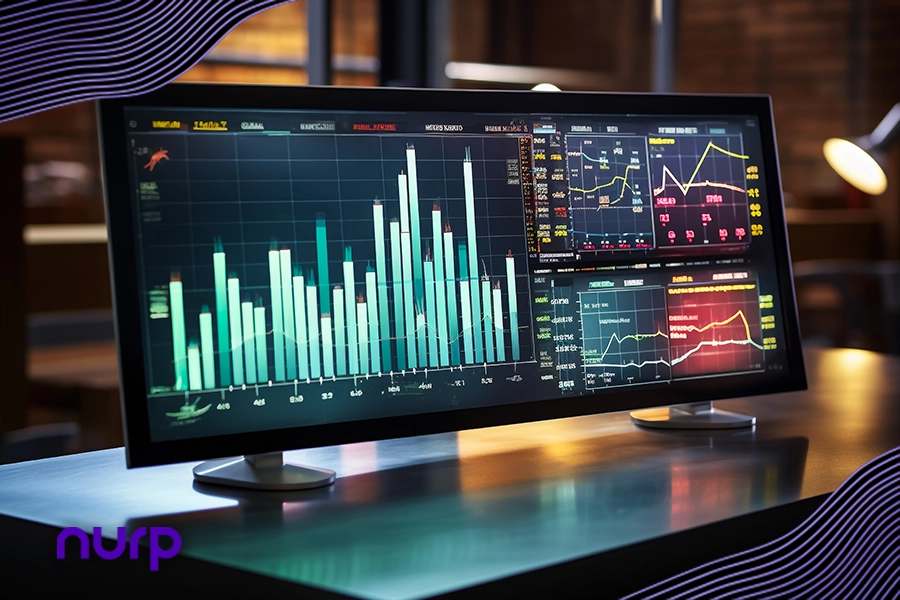Key takeaways:
AI tools can improve stock market analysis with predictive analytics and decision precision, leveraging machine learning for in-depth financial insights.
These tools efficiently forecast trends and analyze sentiments, optimizing portfolio and risk management.
Key challenges involve navigating technical, data accuracy, ethical, and regulatory complexities.
AI’s impact on trading speed and accuracy is notable. Future developments are expected to enhance prediction precision and expand user access through advanced technologies.
As AI tools advance, ethical use and regulatory oversight will be essential, ensuring market integrity and broader access to data-driven investment strategies.
Artificial intelligence (AI) advancements have revolutionized various industries, and the world of finance is no exception. With its dynamic nature and countless variables, the stock market presents a unique challenge for investors and traders.
However, AI-powered tools have emerged as game-changers in stock market analysis, providing valuable insights, precisions, and informed decision-making.
In this comprehensive guide, we will delve into the realm of stock market analysis AI tools, exploring their benefits and functionalities and how they can empower investors to navigate the complexities of the stock market confidently.
Understanding Stock Market Analysis AI Tools
Stock market analysis AI tools leverage machine learning algorithms and big data analytics to analyze vast amounts of financial data, identify patterns, and predict stock prices, market trends, and investment opportunities. These tools are designed to assist investors and traders in making data-driven decisions and maximizing their investment potential.
Here are key aspects to consider when exploring stock market analysis AI tools:
Data Gathering and Processing: Stock market analysis AI tools collect and process vast amounts of financial data from various sources, including historical stock prices, company filings, news articles, and social media sentiment. This comprehensive data gathering allows for a holistic view of the market and enables accurate analysis.
Pattern Recognition and Prediction: AI algorithms recognize patterns and trends within complex datasets. Stock market analysis AI tools utilize machine learning techniques to identify historical patterns, correlate them with relevant market factors, and generate predictions about future stock price movements. These predictions serve as valuable insights for investors in decision-making.
Sentiment Analysis: AI tools can analyze market sentiment by processing textual data from news articles, social media posts, and online forums. Sentiment analysis helps capture market participants’ collective opinions and moods, providing insights into how news events or public opinion may impact stock prices.
Risk Assessment and Portfolio Optimization: AI tools aid in assessing investment risks by analyzing historical data, calculating risk metrics, and simulating various scenarios. This assists investors in optimizing their portfolios, determining the most efficient asset allocation, and minimizing risks associated with market volatility.
Trading Signal Generation: AI tools use trading signals based on predefined criteria and algorithms for stock market analysis. These signals indicate the optimal timing for buying or selling stocks, helping investors capitalize on trading opportunities. The signals can be generated in real time, providing investors with up-to-date information for timely decision-making.
Benefits of Stock Market Analysis AI Tools
Integrating AI tools in stock market analysis offers numerous benefits for investors and traders like:
Enhanced Decision-Making: AI tools provide investors with valuable insights and predictions based on data analysis. By leveraging algorithms, investors can make informed decisions backed by comprehensive analysis, reducing the reliance on intuition and emotions.
Time Efficiency: AI tools can process vast amounts of data and generate insights within seconds. This saves investors significant time compared to manual analysis, enabling them to react quickly to market changes and seize time-sensitive opportunities.
Improved Accuracy: AI tools can analyze complex datasets and identify patterns that may not be apparent to human analysts. This leads to more accurate predictions and a better understanding of market dynamics, enabling investors to make more precise investment decisions.
Risk Management: AI tools assist in assessing investment risks by analyzing historical data, calculating risk metrics, and simulating various scenarios. This enables investors to implement risk mitigation strategies and make informed choices to protect their portfolios.
Diversification: Stock market analysis AI tools can evaluate a wide range of stocks and sectors simultaneously. This helps investors identify opportunities for diversification and spread their investments across different assets, reducing concentration risk.
Emotional Discipline: Emotions can cloud judgment and lead to irrational investment decisions. AI tools remove emotional biases from decision-making, relying on data-driven analysis and predefined algorithms. This promotes disciplined and objective investment strategies.
Accessibility: Stock market analysis AI tools are becoming increasingly accessible to individual investors. Many platforms offer user-friendly interfaces, making it easier for investors to access and utilize AI-powered analysis tools without requiring advanced technical knowledge.
Continuous Monitoring: AI tools can constantly monitor market conditions, news events, and other relevant factors. This ensures that investors stay updated on the latest developments and can adjust their strategies accordingly, facilitating proactive decision-making.
Case Studies: Let’s explore a few notable case studies to illustrate further the effectiveness and impact of stock market analysis AI tools. One prominent example is using AI algorithms in high-frequency trading (HFT). HFT firms leverage AI tools to analyze market data, identify patterns, and execute trades at lightning-fast speeds.
These algorithms can process vast amounts of data, enabling HFT firms to capitalize on short-term price discrepancies and generate profits. Another case study involves AI-powered sentiment analysis.
AI tools can gauge public sentiment toward specific stocks or companies by analyzing social media posts and news articles. This information can be invaluable in predicting stock price movements and making informed investment decisions.
Market Trend Analysis: Stock market analysis AI tools excel in detecting and analyzing market trends. These tools can identify long-term trends, such as sector rotations or macroeconomic shifts, as well as short-term trends driven by news events or market sentiment. By understanding market trends, investors can adjust their portfolios accordingly, positioning themselves to take advantage of emerging opportunities or mitigate potential risks.
Risk Management and Portfolio Optimization: Risk management is crucial to successful investing. Stock market analysis AI tools assist investors in assessing and managing risks effectively. These tools can analyze historical data, calculate risk metrics, and simulate different scenarios to evaluate the potential impact on portfolios. By optimizing asset allocation and diversifying holdings, investors can reduce risk exposure and enhance the overall performance of their portfolios.
Backtesting and Performance Evaluation: AI tools enable investors to backtest their trading strategies using historical data. By simulating trades based on past market conditions, investors can evaluate their strategies’ performance and make necessary adjustments. This feature allows for continuous improvement and refinement of investment approaches, leading to better outcomes in the future.
Integration with Trading Platforms: Many stock market analysis AI tools seamlessly integrate with trading platforms, providing a comprehensive solution for investors. These integrations enable investors to access real-time market data, receive trading signals, and execute trades directly from the AI tool’s interface. Such integrations streamline the investment process, saving time and effort for investors.
Continuous Learning and Improvement: AI-powered tools can continuously learn and improve from new data. As more data becomes available, these algorithms adapt and refine their analysis, leading to more accurate predictions and insights. This dynamic learning capability ensures that stock market analysis AI tools stay updated with changing market conditions and maintain their effectiveness over time.
Ethical Considerations: While stock market analysis AI tools offer significant advantages, ethical implications must be considered. Using AI tools raises concerns about data privacy, algorithmic biases, and potential market manipulation. Developers, regulators, and investors must address these concerns and ensure that AI tools are used responsibly and transparently to maintain market integrity.
Limitations and Risks: Despite their capabilities, stock market analysis AI tools have limitations and associated risks. These tools rely on historical data and patterns, which may not accurately reflect future market movements. Additionally, unexpected events or black swan events can disrupt the effectiveness of AI tools. Investors need to understand the limitations and potential risks of using AI tools and complement them with human judgment and expertise.
The Future of Stock Market Analysis AI Tools: The future of stock market analysis AI tools is promising. As AI technology evolves, these tools will likely become more accessible and user-friendly, attracting a more comprehensive range of investors. Integrating natural language processing (NLP) capabilities can further enhance the tools’ ability to analyze news articles, social media posts, and other textual data sources, providing a more comprehensive understanding of market sentiment.
Additionally, deep learning and neural network advancements can enable AI tools to extract more nuanced patterns and insights from complex market data. These developments improve prediction accuracy and a deeper understanding of the underlying factors driving stock market movements.
Furthermore, AI tools combined with other emerging technologies, such as blockchain and decentralized finance (DeFi), holds great potential. Smart contracts and decentralized prediction markets can leverage AI-generated insights to better trading decisions and create new investment opportunities while ensuring transparency and trust within the ecosystem.
Regulatory bodies and industry stakeholders will play a crucial role in shaping the future of stock market analysis AI tools. Establishing guidelines and standards for developing, deploying, and using these tools will be essential to maintaining market integrity, protecting investors’ interests, and addressing ethical considerations.
Lastly, democratizing stock market analysis, and AI tools will likely empower individual investors and democratize access to sophisticated investment strategies. As these tools become more affordable and widely available, investors of all backgrounds can benefit from their insights, leveling the playing field and potentially reducing information asymmetry in the market.
If you want to learn more about how we guide individuals to improve their algorithmic trading strategies through better tools, go to this page and select the best option that suits your present needs.
The post The Power of Stock Market Analysis AI Tools: A Comprehensive Guide first appeared on Nurp.com.








